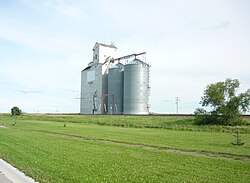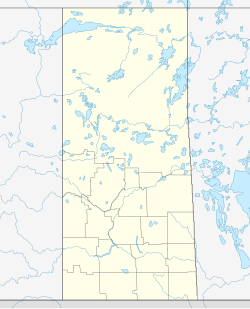Pense, Saskatchewan
Pense | |
|---|---|
Town | |
| Town of Pense | |
 Grain elevator | |
 Pense Pense | |
| Coordinates: 50°24′55″N 104°59′05″W / 50.41528°N 104.98472°WCoordinates: 50°24′55″N 104°59′05″W / 50.41528°N 104.98472°W | |
| Country | Canada |
| Province | Saskatchewan |
| Rural municipality | Pense |
| Post Office established | 1883 |
| Village[1] | March 7, 1904 |
| Town[1] | October 24, 2012 |
| Government | |
| • Administrator | Jennifer Lendvay |
| • M.L.A. Thunder Creek | Lyle Stewart |
| • M.P. Palliser | Ray Boughen |
| Area | |
| • Land | 1.32 km2 (0.51 sq mi) |
| Population (2011) | |
| • Total | 532 |
| • Density | 402.6/km2 (1,043/sq mi) |
| Time zone | UTC-6 (UTC) |
| Postal code | S0G 3W0 |
| Area code(s) | 306 |
| [2][3] | |
Pense is a town of 532 residents (2011 census) in the southern part of Saskatchewan, Canada. Heading west from Regina on the Trans Canada Highway, Pense is the first community with services. Other communities in the area include Grand Coulee, Belle Plaine, Disley, and Rouleau. Pense is approximately 30 km (19 mi) from the City of Regina.
The current mayor of Pense is Bruce Botkin.
Also the unofficial home of the Global Transportation Hub and many of its Employees
Demographics[]
| |||||||||||||||||||||||||||||
References[]
- ^ a b "Urban Municipality Incorporations" (PDF). Saskatchewan Ministry of Government Relations. p. 11. Archived from the original on October 15, 2014. Retrieved February 5, 2017.
- ^ National Archives, Archivia Net, Post Offices and Postmasters, retrieved 2007-05-26
- ^ Government of Saskatchewan, MRD Home. "Municipal Directory System". Retrieved 2013-11-26.
- ^ "2011 Community Profiles". 2011 Canadian Census. Statistics Canada. July 5, 2013. Retrieved 2013-11-26.
- ^ "2006 Community Profiles". 2006 Canadian Census. Statistics Canada. March 30, 2011. Retrieved 2009-02-24.
- ^ "2001 Community Profiles". 2001 Canadian Census. Statistics Canada. February 17, 2012.
Categories:
- Towns in Saskatchewan
- Pense No. 160, Saskatchewan
- Division No. 6, Saskatchewan
- Saskatchewan Division No. 6 geography stubs


